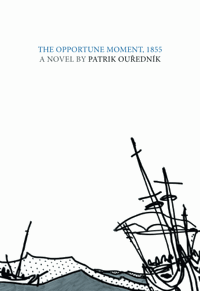 The Opportune Moment, 1855
The Opportune Moment, 1855
by Patrik Ouředník
Dalkey Archive Press, 2011
120 pages / $12.95 Buy from Dalkey Archive Press
Rating: 8.5
Dull is the immediate word for The Opportune Moment, 1855, but not a dullness on Patrik Ouředník’s part, nor on the book’s. Bruno, whose journal comprises the greater part of the book, doesn’t seem like much of an anarchist. His interior life is full of lust for one of the women on his ship to Brazil, vivid dreams about his dead mother, and his confusion over the anarchist’s notion of “freedom” (“And how can I tell whether I’m free?”) sounds very similar to the confusion of an acolyte or seminarian. This he has in common with his fellow anarchist from 1905, whose polemical jilt-letter to his ex-girlfriend, decades after she refused him, starts the book. That writer (incidentally the one who sent Bruno & Co. to Brazil) mentions a journal, “given me by the police officer charged with the investigation” into the demise or disbandment of anarchist settlers of Paraná. The cop couldn’t care less.
Those settlers arrive thirty years after Brazilian independence from Portugal; the letter writer recognizes the “peace-loving” “dignity” of the “dream” that sent/brought (depending on where you stood) Quakers to North America, ultimately scuttled, in his opinion, by their belief in God (vs. an application of Rousseau that yields polyandric settlements); an Italian anarchist delivers a speech (in Italian, of course) from the emperor’s palace in Rio de Janeiro about ‘a government of liberation’: that dullness is the same as the narrator’s in Europeana: A Short History of the Twentieth Century or the senior citizens chirping at each other over a jumper’s corpse in Case Closed. The anarchists (about to split into anarchists and communists) present a churning banality that amuses everyone around its edges until they feel its crush. People eventually show up to the settlement carrying machetes and groups of Bruno’s entries behave as if previous groups never were written. The narrative shreds: the world, or their closed one, is of the future that shuns a past, a false paradox that cancels itself anyway.
The settlers’ language engineers that cancelation, which contradicts the letter writer (“Were people to have a little more rationality in them, war today would be a forgotten word”). Ouředník, when asked why Europeana is so short, said that the three words for the twentieth century were “haste,” “infantilism,” and “scientific,” so that particular book had to be “hurried,” “juvenile,” and “contradictory.” The Opportune Moment isn’t necessarily formed the same way, but the approach appears similar. What characterizes anarchists, or communists, or Germans—the stereotypes of groups (especially Italian anarchists, who can’t catch a break), are certainly in the text, and yes, they’re sometimes funny, but to have only that isn’t enough for even a short book. Instead, Bruno practices anarchy as a linguistic force in his simple journal. How could he keep time, for example? Why would he?
The world constantly begins anew. Time is the prison of civilization.
Tags: Dalkey Archive Press, Patrik Ourednik, The Opportune Moment

this looks good. I’ve been into Dalkey lately. Thanks for the review.
[…] At HTML Giant, Patrik Ouředník’s The Opportune Moment, 1855 is reviewed. […]